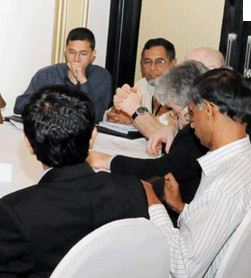Voting: the great church splitter
‘One person; one vote’ may be the preferred option in a democratic situation but it has no place in the body of Christ.
 Speaking to a friend the other day about the turmoil of the ‘Arab Spring’ she remarked: “I suppose the best system of government is that of having a benign dictator”. At one level there is support for this view. However, and apart from the notion of being ‘dictated to’ just doesn’t sound right, as we know there is no such thing on the planet as someone who is truly benign. Speaking to a friend the other day about the turmoil of the ‘Arab Spring’ she remarked: “I suppose the best system of government is that of having a benign dictator”. At one level there is support for this view. However, and apart from the notion of being ‘dictated to’ just doesn’t sound right, as we know there is no such thing on the planet as someone who is truly benign.
The ideal system is in fact one of monarchy. But the only one who can be totally trusted to be the monarch is God. In that sense the Christian church is ideally placed - with God’s sovereign will and purposes being worked out through the head of the church who is Jesus Christ, and by the channel of the Holy Spirit; the triune Godhead in divine harmony.
But in fact none of the three main systems of church government (so-called) operate on truly Biblical principles. Episcopacy is a man-centred hierarchy (the word means ‘priestly rule’). Presbyterianism – though in the purest sense, biblical – is, in practise, a mixture of oligarchy, democracy, bureaucracy and hierarchy. Meanwhile, Congregationalism is firmly based on the democratic voting sytem.
Utilising the world's systems
 Any church taking decisions into a voting scenario is on a path which can only – sooner or later, on one issue or another – lead to trouble; often serious trouble. How many local churches, and not just local churches but denominations, have come to ruin over a ‘split vote’? Any church taking decisions into a voting scenario is on a path which can only – sooner or later, on one issue or another – lead to trouble; often serious trouble. How many local churches, and not just local churches but denominations, have come to ruin over a ‘split vote’?
By definition a split vote self-evidently illustrates that one side or the other has failed to discern the mind of the Lord. In the worst of cases, and often the case, where serious disagreement is evident, neither side is in tune with the Holy Spirit.
[It is entirely possible in the disagreement that arose between Paul and Barnabus (Acts 15:39) that neither had it right. It may well have been in the best purposes of God that in fact they did in fact go their separate ways at that time; but neither realised it.]
In Old Testament times there is the suggestion that some decision-making mechanism using the Urim and Thummin was employed to give guidance (Ex 28:30; Num 27:21; cf Neh 7:65). Even in the early New Testament period we read of the first disciples ‘casting lots’ in order find a replacement for Judas (Acts 1:26).
[In fact some commentators suggest that even in seeking to ‘fill the vacant post’ the disciples got it wrong. It is suggested that in jumping the gun they effectively pre-empted God's dealings with Paul who, following his Damascus Road experinence, was God’s choice as the replacement twelfth apostle?].
This manner of selection – akin to pulling names from a hat - was even that used by the Roman soldiers in dividing up Jesus’ clothes (Matt 27:35).]
Whichever way, the above episode was (and is) the last time that a decision were taken on that basis. So how should we govern our corporate affairs within the body of Christ? In fact the principle is extremely easy to understand; albeit significantly more involved in putting into practise.
Reaching a settled will...
 In a single chapter in the book of Acts we see a godly principle being outworked in a pragmatic ‘real life’ situation. A situation of concern and contention arose around the Judaising activities of some men from Judea: this brought Paul and Barnabas ‘into sharp dispute and debate with them’ (Acts 15:2). In a single chapter in the book of Acts we see a godly principle being outworked in a pragmatic ‘real life’ situation. A situation of concern and contention arose around the Judaising activities of some men from Judea: this brought Paul and Barnabas ‘into sharp dispute and debate with them’ (Acts 15:2).
In response Paul, Barnabas and some other believers were tasked with going from Antioch to consult with the apostles and elders in Jerusalem. This meeting itself produced some lively debate (Acts 15:7) In the event, Peter reminded those present of an essential gospel truth (Acts 15:7-11) and James drew together the combined thinking of the gathering (Acts 15:13-21).
Following James’s pronouncement we see the first element of the biblical principles in decision-making. The text shows a happy consensus amongst ‘the apostles, elders and the whole church’ (Acts 15:22) setting out a plan of action.
Whatever the debate and discussion in the lead-up to this point, it certainly seems that there was a unity and harmony in the ‘settled will’ of all concerned (Acts 15:25). This ‘contented consensus’ in fact prevailed some time earlier in the case of provision for the Greek widows where the apostles’ response ‘pleased the whole group’ (Acts 6:5) of the disciples there gathered (Acts 6:2). In their writing to the Gentile believers in Antioch again we see this dynamic (Acts 15:25) of unity.
However, we need to move on in the letter to find the all-important component of the decision-making process: in fact it is the vital component which underpins the unity which the chapter earlier describes.
There can be no true harmony that is apart from the express and very particular will of God. This divinely-inspired unity of thought and action we find in the verse which sums up the heart of the matter: “It seemed good to the Holy Spirit and to us” (Acts 15:28).
 It is only as a group of believers discerns the mind of God in any matter that they can move forward in any confident and harmonious fashion. As stated earlier, a split vote indicates that one, or perhaps both parties have failed to discern God’s best purposes. It is only as a group of believers discerns the mind of God in any matter that they can move forward in any confident and harmonious fashion. As stated earlier, a split vote indicates that one, or perhaps both parties have failed to discern God’s best purposes.
This is the most likely outcome when the group which is voting is a mixture of believers and unregenerate individuals or, if the group is totally comprised of godly, humble Christ-centred disciples, then they have not found the will of the Lord.
[The former is very often the situation, and invariably found in churches which operate on a ‘get the unbelievers into church’ mode of disciple-winning. In most churches there are those who have not surrendered to Christ and also believers who are, as we all might be at one time or another, influenced by the world, the flesh or the devil.]
The latter circumstance is very common also with a group of believers operating as a business committee with a perfunctory prayer at the start and end of the proceedings.
So the question arises “How do we discover what ‘seems good to the Holy Spirit and to us?” A unanimous assent should lie at the end of the process, and a system of voting should never be part of or the determinant in the process.
But if voting is out, what is the procedure?
A profound simplicity
To find a clue to the process we need to travel backwards in Luke’s account when the apostles were gathered together prior to Paul's first missionary journey. We can see from the account (Acts 13:1-3) that the gathering at Antioch of godly men wasn’t a committee meeting. There was no agenda or plan of action. What we are told is these men, at the time, were merely – in a manner that was simple yet also profound - ‘worshipping the Lord and fasting’ when God spoke so clearly to them.
[The Authorised Version translates the group’s actions as ‘ministering to the Lord and fasting’. And what a thought this is; that we, fallen mortals, can in any way ‘minster’ to the Lord. That we can in some measure bring delight to the father heart of God is almost beyond comprehension.]

Here the disciples were, taking time out in the presence of God; free from the distractions of the world and, with the sharpened awareness which fasting brings, focussed completely on Him. It was into this that the voice of the Holy Spirit brought the revelation of the mind and purposes of God to them.
But we need to ask ourselves how often, in the daily dash of a busy life and church programmes, do we – together - take the time and make the space to gather in the presence of God? How much is it our common practice, to ‘wait upon Him’ with Christ in our midst, so that he might reveal His will to us; and deliver that empowering and uniting sense of God’s explicit direction?
The process in fact takes time. It takes a focussed, dedicated persistence in a situation of Christ-centred, Spirit-led, God-conscious and self-denying prayer. Yet the outcome is a great blessing: “And thine ears shall hear a word behind thee, saying, This is the way, walk ye in it, when ye turn to the right hand, and when ye turn to the left" (Is 30:21).
It is only in the epicentre of God’s perfect purpose that we can expect the full measure of His blessing and find ourselves in that place where we can claim all the promises of God in terms of provision, direction, empowering and blessing.
And voting is certainly not the way to get there. |